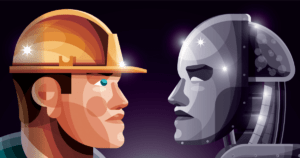Life After AI: Will The Future Be Free?
Computers are getting smart enough to take over more and more complex jobs―soon there won’t be any human work left
Will Robots Take Our Jobs?
By 2025, the number of robots in the U.S. could quadruple
On average, 1 robot does the work of 5.6 people
Robots per Thousand Workers:
1990s: 0.6
2000s: 2.6
Today’s biggest telecommunications company has 1/10 the workforce of past giants.
1964, AT&T
Worth $267 billion (in today’s dollars)
758,611 employees
2015, Google
Worth $370 billion
55,000 employees
Artificial intelligence threatens more than just manufacturing
Journalism: The Associated Press publishes AI-generated articles about corporate earnings
Healthcare: IBM’s Watson AI individualizes cancer treatment by analyzing patient history, genetics, and medical literature
Transportation and Delivery: Truck drivers are anticipating the threat from driverless cars made by Google and other companies
By 2033, 47% of US jobs will be at risk of automation from industrial robots
A Future Without Work
More Automation Will Mean Less Work
The Industrial Revolution cut the work week from 60 hours to 40 hours
Machines took over physical labor
Humans continued to contribute cognitive labor
In 1930, John Maynard Keynes predicted that automation would reduce labor enough to create a 15-hour work week
Economics of Free: If we’re not working, how do we pay for stuff?
Universal basic income:
Heavy tax on corporate income distributed to everyone equally
Replacement for employment-based income, allowing people to live without work
Cheap or free goods and services, brought to you by automation
Robots will take over manufacturing
3D Printing will offer easy customization
Artificial intelligence will take over service industries
Everyone will have the luxuries that are currently only available to the wealthy
— Driverless cars instead of chauffeurs
— Smart home tech instead of maids
— Artificial intelligence instead of personal assistants
Americans consider their jobs important…for more than just money
Which aspects of a job do you feel are very important?
— Interesting work 51%
— Chance to benefit society 47%
— Working to help others 41%
— Personal contact with others 22%
In a world without work, what will people do with their time?
Free Time and Freedom of Employment
Gig Economy
For those who choose to keep working, there will be competition for smaller bits of work
Since 2010, employment in temporary help services (like Uber drivers) has grown over 50%
TaskRabbit finds users work performing chores and other small tasks
The government could set up a national database to help people find gig-work
Volunteer Work
More free time could mean more devotion to good causes
In 2015, part-time workers were more likely than full-time workers to participate in volunteer work
Part time: 31.1%
Full time: 26.3%
Hobbies of the Future
Gaming
Gaming will offer an opportunity to achieve success in a world without work
Augmented reality will allow gamers to play from anywhere
Virtual reality will create more depth and “realness”
Art & Artisanship
Machines can create unparalleled images, but not art that reflects human experience
Artisanship will be more appreciated and handmade goods will become more valuable
The irony is that our technological future will not be about technology, but all about our humanity.” -Toby Walsh, author of Android Dreams: The past, present and future of artificial intelligence
What would you do in a world where everything is free?
Sources:
https://papers.ssrn.com/sol3/papers.cfm?abstract_id=2940245
http://www.businessinsider.com/john-keynes-predicted-15-hours-workweek-2015-8
https://www.theatlantic.com/magazine/archive/2015/07/world-without-work/395294/
https://www.nytimes.com/2015/12/10/opinion/the-end-of-work.html
http://www.aei.org/wp-content/uploads/2017/08/Political-Report-September-2017.pdf
https://data.bls.gov/timeseries/CES6056132001
https://www.thebalance.com/best-sites-to-find-gig-jobs-4150364
https://www.bls.gov/news.release/volun.nr0.htm
https://www.entrepreneur.com/article/305831
https://www.theguardian.com/science/political-science/2017/oct/01/will-robots-bring-about-the-end-of-work

